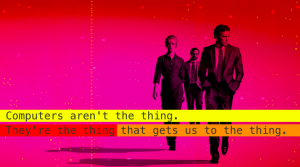Most People Don’t Want A Computer
February 18th, 2021 / By Jason Eckert
In the past few decades, people of all ages across North America have become technology-literate in some way or another. Many of them weren’t introduced to technology via desktop or laptop computers, but instead through a smartphone or tablet. Similarly, many desktop and laptop users have switched to using their smartphone or tablet over the past decade to interact with the online world.

A growing number of people are choosing to use other devices for their online activities on a daily basis instead of computers.
After all, smartphones and tablets are incredibly easy to use. You open an app to do what you want (social media, shopping, taking pics of food, etc.), and the rest can be done in a Web browser. It doesn’t matter where your files are stored locally because they’re easily searchable, and they’re automatically synced to the cloud so that you don’t lose them.
This simple technology model is becoming the norm for more and more people every day. These people don’t want to navigate a complex computer operating system like Windows or Linux or macOS. They don’t want to know where things are stored, or learn the plethora of utilities that comprise a computer operating system. They just want to use the Web, and they don’t want to have to fiddle too much with the device that takes them there. It’s like the Joe MacMillan quote from the TV series Halt and Catch Fire ( https://www.youtube.com/watch?v=YQLbi4VXYcA ):

However, to take full advantage of the Web, a smartphone or tablet just ain’t gonna cut it. Zoom conferencing calls, serious online shopping, reading New York Times articles, or filling out your income taxes are just better on a computer with a physical keyboard, large screen, and more processing power. And the large cohort of mobile Web users are starting to clue into this and want more.
Enter Chromebooks: The computer that isn’t a computer
Google seemed to understand these trends before anyone else did. After all, Chromebooks perfectly fit the needs of mobile Web users that wanted more. Chromebooks provide a full Web experience with the world’s most common Web browser (Chrome), and their Chrome OS has the same cloud integration and ease-of-use as any smartphone or tablet.
Moreover, there are wide variety of Chromebooks out there to fit anyone’s needs and budget. Grade schools and high schools have been buying $250 Chromebooks en mass for years (much more now because of the COVID-19 pandemic), and $2000+ Chromebooks rival the functionality of high-end laptops to provide the best Web experience!
Apple copies Google
Once seen as an innovator, there’s nothing spectacular about America’s favourite fruit company nowadays to professional computer users other than the latest stock value and lawsuit headlines. And earlier this year when Apple announced that they were transitioning their entire computer line to the same ARM chips used in their phones and tablets and simplifying their macOS operating system to mirror an iPhone, it became clear that they’ve decided to take the Chromebook route to better fit with their future customer base.
But some users actually need a powerful computer!
There will always be a community of professionals that do need a traditional computer with serious processing power alongside a deeper knowledge of technology. For example, advanced content and media creators, graphical artists, developers, gamers, engineers, cost accountants, and many, many more.
So, powerful desktop and laptop computers aren’t going away. Instead, they’ll likely evolve even more quickly compared to the present as the need for technology and advanced content creation intensifies.
But as Chromebooks (and future MacBooks) continue to climb in popularity, we’re going to see a stark division between technology users. There’ll be the Web users touting their Chromebooks and MacBooks, and then there’ll be the professional users that use desktop or laptop computers running the Windows or Linux operating system alongside powerful tools and programming languages.
In other words, we’re fast moving to a world where you’re either a Web user or a computer professional.
I already know what side I’ll be on 😉
Click to learn about the Technology programs offered at triOS!
